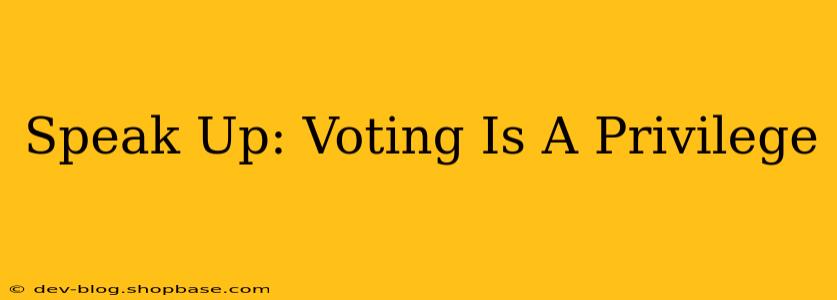In the tapestry of a democratic society, the right to vote is often mistakenly conflated with the privilege it truly is. While enshrined in law and constitutionally protected in many countries, the act of voting is more accurately a privilege, earned and maintained through the active participation and vigilance of its citizens. Understanding this nuanced distinction is crucial to appreciating its profound value and fostering a more engaged and responsible electorate. This isn't about diminishing the importance of the vote; it's about elevating its significance by understanding the responsibilities that come with it.
What's the Difference Between a Right and a Privilege?
Before delving deeper, let's clarify the terms. A right is an inherent entitlement, something you are born with, irrespective of your actions or contributions. Examples include the right to life, liberty, and in some cases, the pursuit of happiness. A privilege, on the other hand, is a benefit, advantage, or opportunity granted based on certain conditions, often involving merit, effort, or adherence to societal norms. It can be earned, lost, or revoked depending on individual actions or societal changes.
Why Voting Is More Accurately a Privilege
While the legal framework protects the right to vote, the privilege lies in the ability to exercise that right effectively. This encompasses several key aspects:
-
Access to Information: Informed voting requires access to accurate and unbiased information about candidates, policies, and relevant issues. This isn't automatically granted; individuals need to actively seek out reliable sources, critically analyze information, and combat the spread of misinformation. The ability to access and process information effectively is a crucial privilege.
-
Understanding the Process: Navigating the complexities of voter registration, polling locations, and the electoral system itself requires effort and understanding. Individuals who lack this knowledge or face systemic barriers are effectively disenfranchised, highlighting the conditional nature of the voting privilege.
-
Time and Resources: Participating in the voting process takes time and resources. Many people may struggle with work schedules, transportation challenges, or childcare responsibilities, making it difficult to exercise their right to vote. The ability to dedicate time and resources to participating signifies a level of privilege.
-
Freedom from Repression: In many parts of the world, the freedom to vote without fear of reprisal or intimidation is far from guaranteed. Those living under authoritarian regimes or experiencing voter suppression tactics are denied the privilege of casting a free and fair ballot.
How Can We Enhance the Privilege of Voting?
Understanding voting as a privilege compels us to act responsibly to safeguard and enhance it for all. This involves:
-
Promoting Voter Education: Initiatives focused on civic education and voter registration are crucial to equip citizens with the knowledge and tools to participate effectively.
-
Addressing Systemic Barriers: Tackling issues like voter ID laws, limited polling places, and language barriers ensures equitable access to the ballot box for all citizens.
-
Combating Misinformation: Actively fighting the spread of false and misleading information is paramount to ensuring informed and rational decision-making.
Frequently Asked Questions
Q: Isn't voting a fundamental human right?
A: While many countries legally enshrine the right to vote, the ability to fully and effectively exercise this right depends on numerous factors, such as access to information, understanding of the electoral system, and freedom from intimidation. These factors highlight the privilege aspect of voting.
Q: What can I do to protect the privilege of voting?
A: Engage in civic education, support organizations fighting voter suppression, promote accurate information, and actively participate in the electoral process. Your engagement helps preserve and enhance the privilege for all.
Q: How can we ensure everyone has equal access to the privilege of voting?
A: By addressing systemic barriers, ensuring fair representation, and promoting inclusive civic education initiatives, we can create a more equitable system where everyone can exercise their right to vote effectively.
By recognizing voting as a privilege—a valuable right that demands active participation and ongoing protection—we can cultivate a more engaged, responsible, and robust democracy. It's a privilege worth safeguarding, and the responsibility lies with every citizen who values the democratic process.

